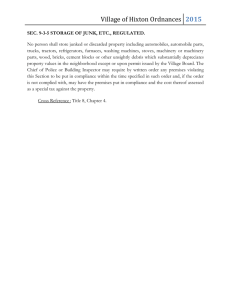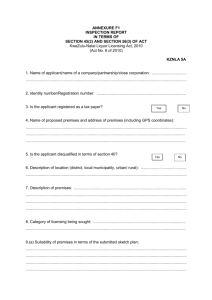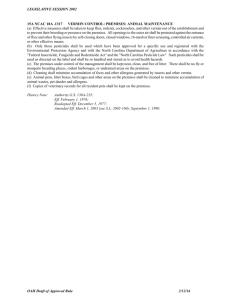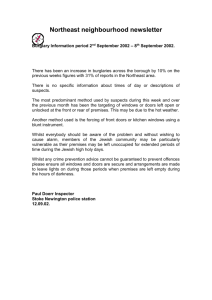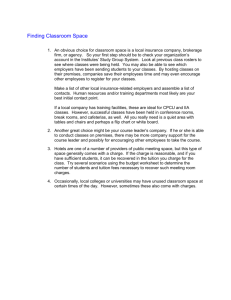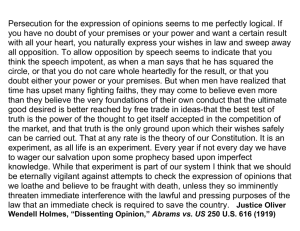Registration of a food business
advertisement
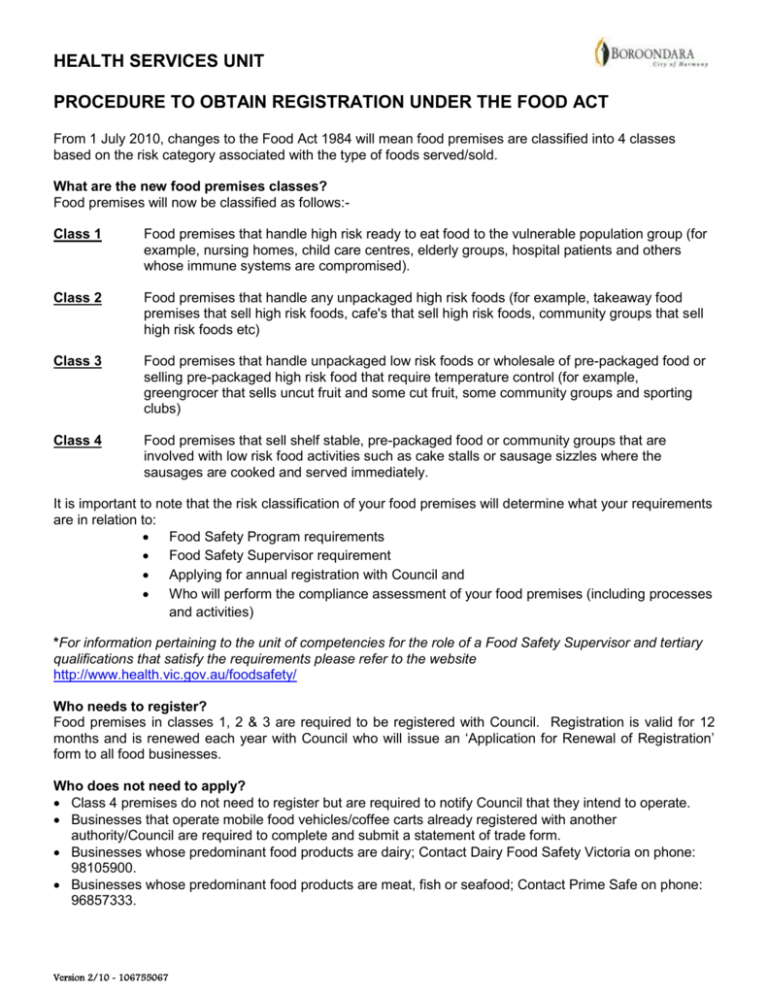
HEALTH SERVICES UNIT PROCEDURE TO OBTAIN REGISTRATION UNDER THE FOOD ACT From 1 July 2010, changes to the Food Act 1984 will mean food premises are classified into 4 classes based on the risk category associated with the type of foods served/sold. What are the new food premises classes? Food premises will now be classified as follows:Class 1 Food premises that handle high risk ready to eat food to the vulnerable population group (for example, nursing homes, child care centres, elderly groups, hospital patients and others whose immune systems are compromised). Class 2 Food premises that handle any unpackaged high risk foods (for example, takeaway food premises that sell high risk foods, cafe's that sell high risk foods, community groups that sell high risk foods etc) Class 3 Food premises that handle unpackaged low risk foods or wholesale of pre-packaged food or selling pre-packaged high risk food that require temperature control (for example, greengrocer that sells uncut fruit and some cut fruit, some community groups and sporting clubs) Class 4 Food premises that sell shelf stable, pre-packaged food or community groups that are involved with low risk food activities such as cake stalls or sausage sizzles where the sausages are cooked and served immediately. It is important to note that the risk classification of your food premises will determine what your requirements are in relation to: Food Safety Program requirements Food Safety Supervisor requirement Applying for annual registration with Council and Who will perform the compliance assessment of your food premises (including processes and activities) *For information pertaining to the unit of competencies for the role of a Food Safety Supervisor and tertiary qualifications that satisfy the requirements please refer to the website http://www.health.vic.gov.au/foodsafety/ Who needs to register? Food premises in classes 1, 2 & 3 are required to be registered with Council. Registration is valid for 12 months and is renewed each year with Council who will issue an ‘Application for Renewal of Registration’ form to all food businesses. Who does not need to apply? Class 4 premises do not need to register but are required to notify Council that they intend to operate. Businesses that operate mobile food vehicles/coffee carts already registered with another authority/Council are required to complete and submit a statement of trade form. Businesses whose predominant food products are dairy; Contact Dairy Food Safety Victoria on phone: 98105900. Businesses whose predominant food products are meat, fish or seafood; Contact Prime Safe on phone: 96857333. Version 2/10 - 106755067 Summary of Risk Classifications of Food Premises The table below demonstrates the requirements for each of the four (4) food premises classes with the changes to the Food Act 1984 effective as of 1 July 2010. The tick denotes you must comply with the specified requirement The cross denotes you are not required to comply with the specified requirement Risk Classification Annual Registration *Food Safety Supervisor (FSS) Food Safety Program (FSP) Compliance Assessment You can select to implement either a Non Standard FSP or Standard FSP Council will assess and Third Party Auditor will assess You can select to implement either a Non Standard FSP or Standard FSP Depending on type of FSP:- Class 1 Class 2 Standard FSP Council will assess only Non Standard FSP Third Party Auditor will assess only Class 3 No FSS required (Recommended free online training for staff) No FSP required however must maintain simple food safety records No FSS required (Recommended free online training for staff) No FSP required Assessment conducted by Council only Class 4 No annual registration required only notification and statement of trade form 106755067 October 2011 No assessment required REGISTRATION PROCESS 1. Initial Discussions / Approval Discuss your initial proposal with Planning, Building and Environmental Health Officers. 2. Onsite Appraisal Arrange an on-site appraisal of the premises with an Environmental Health Officer before you secure your lease. This will allow you to clarify any concerns on major internal fit-out and finishes required (eg. floors, walls, ceilings, mechanical exhaust systems, etc.). 3. Compliance with other utilities Ensure that other utilities (eg. electricity, water, sewerage, and gas) are contacted to ensure that you comply with their particular standards/codes. 4. Plans and menu submission Although not a mandatory requirement it is requested that a proprietor submit two copies of floor plans with a scale not less than 1:100 to Health Services showing the layout of the premises. The floor plans should include elevations drawn to scale, with details about location, method of installation and type of finishes of ALL surfaces, fixtures & equipment. You are required to contact Yarra Valley Water (ph 9874 2122) in relation to waste water and sewerage requirements eg. type and size of grease trap (if required). Grease traps are to be located externally unless otherwise approved by Health Services. A copy of the menu and any other relevant information such as specifications on mechanical exhaust systems (if proposed to be installed) are also required to be submitted. Mechanical exhaust systems must comply with the Australian Standards 1668. Note: A fee applies for structural plans review; contact Health Services for this fee. 5. Plans Review An Environmental Health Officer will check that the plans meet the relevant standards, eg. Food Standards Australia New Zealand (FSANZ), Food premises equipment food safety standards, etc. A letter will be sent advising of any additional requirements which will need to be met that have not been clearly shown on the plans. Note: Please allow for a standard 14 day service for plans review. 6. Commencement of works Upon notification that your plans have been reviewed by the Health Services and you have received the appropriate permits from Planning, Building, and/or Yarra Valley Water (if required) you may commence works. 7. Interim inspections Contact the Environmental Health Officer for interim inspections of works as they are progressing. This will assist you in meeting all the requirements and help to prevent any costly mistakes if works have commenced without the plans being reviewed. Note: No additional fees will be charged for these inspections. 8. Food Safety Program Submission Premises in classes 1 & 2 are required to have a food safety program. A copy of the program (or the relevant pages) is required to be available for inspection by an Environmental Health Officer at all times. (Refer to ‘Food Safety Program’ fact sheet). Class 3 businesses will be required to undertake new, simplified record taking. 9. Food Safety Supervisor Proprietors of class 1 & 2 food premises, as part of the requirements outlined in your food safety program, must nominate a food safety supervisor who has undertaken approved food safety training to meet the competency standard for the business. These details should be filled out correctly in your food safety program and a copy of the relevant qualifications are to be provided to Council 106755067 October 2011 Free online training is available for other staff and proprietors of class 3 & 4 food businesses. This can be found at http://dofoodsafely.health.vic.gov.au/ 10. Final Inspection A final inspection is to be organised with the Environmental Health Officer once all works have been completed. This inspection should be arranged at least one week prior to the proposed opening date. 11. Application for registration form Following the inspection, if all requirements have been met, you will be given an ‘Application for Registration' form which is to be completed and submitted along with the prescribed fee which is listed on the form. 12. Registration granted Once registration has been granted, a ‘Certificate of Registration’ is issued and the business can commence operation. Registration will be conditional on the basis that the food safety program is implemented. Registration may be suspended or revoked if conditions are not met. Note: Your premises must not open to the public until approval is given by Health Services. Under the Food Act it is an offence to operate a food business without being registered and can lead to Council taking legal action. PUBLIC UTILITIES / RESPONSIBLE AUTHORITIES Type of Inquiry Authority Contact Details Refer to attachment Food Safety Programs Phone: 9278 4701 Boroondara Health Services Refer to attachment http://www.health.vic.gov.au/foodsafety Department of Health Food Safety Supervisor training Phone: 9278 4701 Boroondara Health Services Planning permits; ‘Change of 8 Inglesby Rd, Camberwell 3124 use’ for the premises, seating Boroondara Planning capacity, parking requirements, Department Phone: 9278 4744 liquor licensing, etc. Building and occupancy permits; number of toilets required, disabled access 8 Inglesby Rd, Camberwell 3124 Boroondara Building requirements, mechanical Department Phone: 9278 4860 exhaust system requirements, etc. Kerbside signage and street 8 Ingleby Road Camberwell 3124 Boroondara Local Laws furniture Department Phone: 9278 4888 Waste water and sewerage Yarra Valley Water Phone: 13 17 21 requirements eg. Grease traps Liquor Licensing Liquor license Phone: 1300 650 367 Commission Commercial waste/recycling Listed under Waste Services and Recycling Services in the Yellow services Pages Registration of dairy food Dairy Food Safety Victoria Phone: 9810 5900 businesses Registration of meat, fish or Prime Safe Phone: 9685 7333 seafood businesses Phone: 9203 9700 Gas appliances/connections Energy Safe Victoria http://www.ogs.vic.gov.au Any further enquiries should be directed to the Health Services; 8 Inglesby road Camberwell 3124 Phone: 9278 4710. 106755067 October 2011

